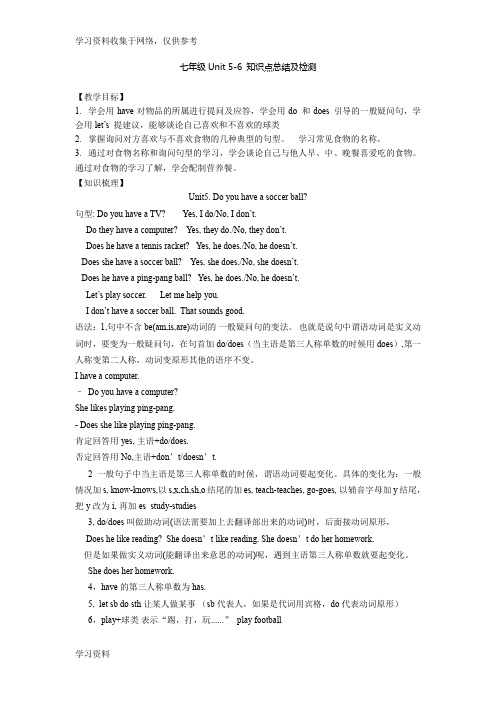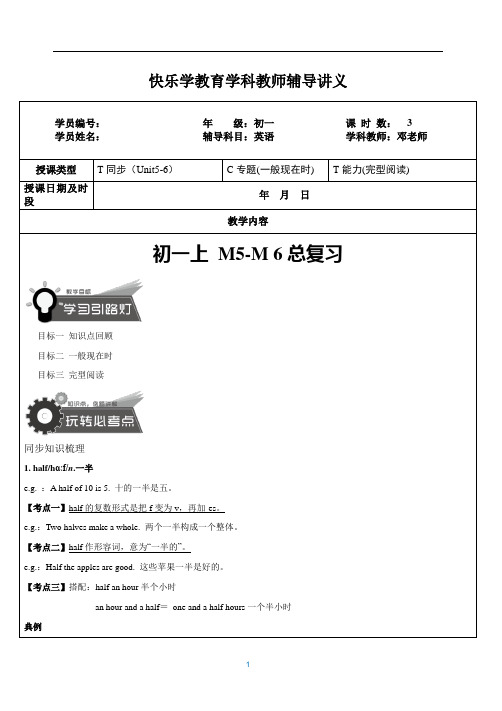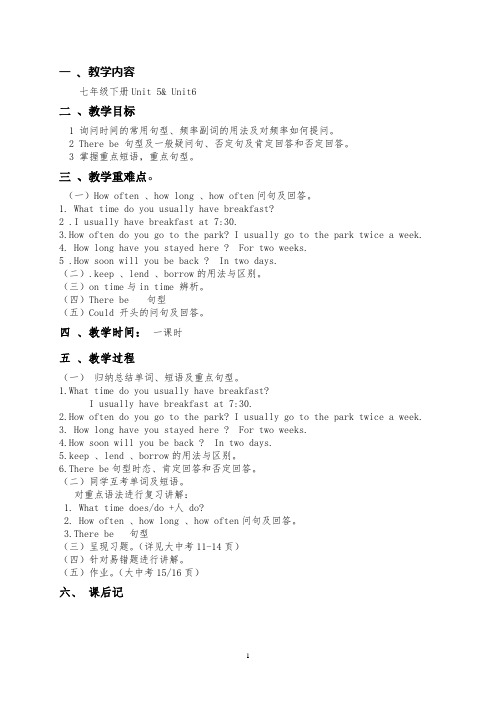七年级 unit5-6知识点 教案
英语:Unit 5-Unit 6 学案(北师大版七年级上)

英语:Unit 5-Unit 6 学案(北师大版七年级上)一. 教学内容:Unit 5——unit 6 复习单词、短语、句型复习sure 对……有把握;确信经常习惯说I am sure. I am not sure.go 去go skating go swimming go skiing go shoppingenjoy 喜欢,享受enjoy doingMy little sister enjoys reading very much.worry 烦恼,忧虑be worried about 为……担心Don’t worried about me, I can solve the problem.rent 租My mother rents the house to an old woman.lend 借给…… Please lend me your book.borrow 借Could I borrow your book?stop 停止stop to do停下来去做某事stop doing 停止做……Jim, stop to do your homework.Jim , stop doing your homework.pass pass somebody something pass something to somebodyPlease pass me the salt. Please pass the salt to me.重点短语be good at 擅长My mother is good at housework.That boy is good at playing computer games.a lot of 许多的There is a lot of orange juice in the bottle.There are a lot of bottles on the desk.a lot of = lots ofa little 少量少许There is only a little orange in the bottle.a few 少量少许I buy a few oranges for the little girl.get … ready for 为……准备好get … ready for = be ready forI am ready for the meeting.I get ready for the meeting.Are you ready for the meeting?Do you get ready for the meeting?be interested in 对……感兴趣I am interested in playing football.There are many interesting books in the school library.a type of 一种Ping pong is a type of sportsat the end of 在……结尾;在……末端At the end of the road ,there is a shop.look for 寻找I looked for my purse anywhere, but I can’t f ind it.重点句型语法情态动词can 的用法can为情态动词,其特点如下:(1)本身有词义,是“能、会”的意思,表示能力。
人教版 七年级英语上册 unit5-6 知识点总结

七年级Unit 5-6 知识点总结及检测【教学目标】1.学会用have对物品的所属进行提问及应答,学会用do 和does 引导的一般疑问句,学会用let’s 提建议,能够谈论自己喜欢和不喜欢的球类2.掌握询问对方喜欢与不喜欢食物的几种典型的句型。
学习常见食物的名称。
3.通过对食物名称和询问句型的学习,学会谈论自己与他人早、中、晚餐喜爱吃的食物。
通过对食物的学习了解,学会配制营养餐。
【知识梳理】Unit5. Do you have a soccer ball?句型: Do you have a TV? Yes, I do/No, I don’t.Do they have a computer? Yes, they do./No, they don’t.Does he have a tennis racket? Yes, he does./No, he doesn’t.Does she have a soccer ball? Yes, she does./No, she doesn’t.Does he have a ping-pang ball? Yes, he does./No, he doesn’t.Let’s play soccer. Let me help you.I don’t have a soccer ball. That sounds good.语法:1,句中不含be(am,is,are)动词的一般疑问句的变法。
也就是说句中谓语动词是实义动词时,要变为一般疑问句,在句首加do/does(当主语是第三人称单数的时候用does),第一人称变第二人称,动词变原形其他的语序不变。
I have a computer.–Do you have a computer?She likes playing ping-pang.- Does she like playing ping-pang.肯定回答用yes, 主语+do/does.否定回答用No,主语+don’t/doesn’t.2一般句子中当主语是第三人称单数的时候,谓语动词要起变化。
英语辅导讲义外教版七年级上Unit5-6

快乐学教育学科教师辅导讲义学员编号:年级:初一课时数: 3学员姓名:辅导科目:英语学科教师:邓老师授课类型T同步(Unit5-6)C专题(一般现在时) T能力(完型阅读)授课日期及时年月日段教学内容初一上M5-M 6总复习目标一知识点回顾目标二一般现在时目标三完型阅读同步知识梳理1. half/hɑːf/n.一半e.g. :A half of 10 is 5. 十的一半是五。
【考点一】half的复数形式是把f变为v,再加-es。
e.g.:Two halves make a whole. 两个一半构成一个整体。
【考点二】half作形容词,意为“一半的”。
e.g.:Half the apples are good. 这些苹果一半是好的。
【考点三】搭配:half an hour半个小时an hour and a half=one and a half hours一个半小时典例H ________ of the students in our class are boys.2. half past six六点半【考点】表示“几点半”用“half+past+点钟”,也可直接用数字表示。
e.g.:7:30读作:half past seven/seven thirty;12:30读作:half past twelve/twelve thirty【重难点】英语表达时刻主要有以下两种方法:(1)直接表示法(先时后分),整点用“钟点数+o'clock”,o'clock可省略。
e.g.:9:25读作:nine twenty-five;12:30读作:twelve thirty;12:00读作:twelve o'clock(2)添加介词表示法(先分后时)。
表示“几点过几分(在30分钟之内)”,用介词past,其结构是“分钟+past+点钟”。
e.g.:8:20读作:twenty past eight;11:05读作:five past eleven;表示“几点差几分(相差在30分钟之内)”,用介词to,其结构是“分钟+to+下一个点钟”。
Module5-6复习知识梳理教案外研版英语七年级上册

七年级上册Module 5—Module 6教材知识梳理教学目标1掌握时刻的表达法2能用本模块所学的知识介绍学校生活3.能用所学知识写关于动物的一篇文章4.能掌握并会运用的重点词汇或重点短语5.辨析because与because of6.掌握busy 的用法7.辨析also, too, as well 与either8.辨析a little, little, a few 与few9.辨析alone 与lonely10.掌握名词的复数形式11.掌握并能运用一般现在时重点难点1.能用本模块所学的知识介绍学校生活2.能用所学知识写关于动物的一篇文章3.掌握并能运用一般现在时教学步骤:Step1Students read the words of the two Modules5-6Step2展示这两个模块的重点词汇或重点短语,让学生写出答案,然后全班齐读一、重点词汇Module 51. __________ n. 故事—__________(复数形式)2. __________ n. 美术;艺术—__________(名词,表示人)3. __________ v. 喜欢;关爱—__________(反义词)4. __________ v. 做;干—__________(第三人称单数)5. __________ v. 阅读,看懂—__________(第三人称单数)6. __________ v. 生活;住—__________(形容词,表示“活着的”)—__________(形容词,表示“活泼的”)7. __________ adj. 有趣的—__________(动词)8. __________ v. & n. 睡觉—__________(形容词,“睡着的”)Module 61. __________ n. 国家—__________(复数形式)2. __________ adj. 危险的—__________(名词)—__________(反义词)3. __________ adj. 有趣的—__________(名词)4. __________ n. 非洲—__________(形容词)5. __________ n. 亚洲—__________(形容词)6. __________ n. 欧洲—__________(形容词)7. __________ n. 树叶—__________(复数形式)8. __________ adj. 不同的—__________(名词)9. __________ adv. 通常—__________(形容词)—__________(反义词)10. __________ adj. 强壮的;强大的;强烈的—__________(副词)—__________(反义词)二、重点短语Module 51. ________ __________ 吃早餐2. ________ ________ 吃午餐3. ________ ________ 吃饭;吃晚餐4. ________ to ________ 上学5. ________ to ________ 上床睡觉6. go to ________ 开始睡觉;入睡Module 61. ________ ________ 在那边2. be ________ ________ 擅长3. many ________ of 许多种类4. ________ ________ the ________ 全世界5. as ________ as 并且,还6. ________ from=________ from 来自7. ________ ________ 看Step3 复习知识点一.辨析because与because of是从属连词,表示原因的语气最强,常表示必然的因果关系。
Unit5-6七年级下册五单元和六单元教案

反意疑问句 (陈述句+附加疑问句) 反意疑问句中,陈述句用的肯定,后面的附加 疑问句就要用否定;相反,陈述句用的否定,附加疑问句就要用肯定。 There be 句型 There is +单数可数名词/不可数名词+ 地点状语. There are +复数 名词+地点状语. 谓语动词要与跟它最近的那个名词一致(就近 原则) 。 There be 句型的否定式在 be 后加上 not 或 no 即可。注意 not 和 no 的不同: not 是副词, no 为形容词, not a/an/any + n. 相当于 no+ n. There be 句型的一般疑问句变化是把 be 动词调整到句首 There be 表示“某处存在某物或某人”;have 表示“某人拥有某物/某人 ” 询问天气的表达方式: How’s the weather? It’s a raining/sunny day. It’s raining. What’s the weather like? It’s windy. 以-ed 结尾“人感到„的” excited,interested,relaxed 有些表示心理活动的动词的 ing 和 ed 形式分别修饰物和人。如: interest(使感兴趣), interesting 令人感兴趣的(有趣的) , interested 感到有趣的(感兴趣的) , relax(使放松, 放松), relaxing 令人放松的, relaxed 感到放松的 excite( 使 兴 奋 ) , exciting 令 人 兴 奋 的 , excited 感到兴奋的 surprise( 使 惊 讶 ) , surprising 令 人 惊 讶 的 , surprised 感到惊讶的 on the phone / the computer / the Internet / the film / the newspaper / the radio (有 the) 通过电话 / 电脑 / 因特网 / 电影 / 报纸 / 收音 机 on TV 通过电视 Step 2 Recite the phrase . watch TV:看电视 read a book=read books=do some reading:读书 watch a little bird:看一只小鸟 go to the movies:看电影 do (one's)homework:做家庭作业 Thanks for your letter. :谢谢你的来信 thanks/thank sb for doing sth:谢谢某人做某事 How's it going? :你怎么样?(两人见面时) (It’s) Not bad. / Not good. /Great! / Terrible! / Pretty good. / Just so so. 不坏 / 不太好 / 好极了 / 糟糕的 / 相当好 / 一般 (马马虎虎) look cool/e surprised:惊讶(+从句) be surprised to do sth 惊讶做… I’m surprised to see her in the street. 在街上见到她我很惊讶。 be surprised at.... : 对……感到惊讶 I’m surprised at your words. 我对你 的话感到惊讶。
新人教版新目标七年级下第五六单元知识点及练习

启扬补习社七年级英语下册复习一、教学内容:复习巩固七年级下册3-4单元词组及句型。
二、教学重点:复习3-4单元的重点单词及句型,掌握他们在句中的运用,扫除填写句子及翻译,作文等题型的障碍。
三、教学过程:1、先粗略复习一遍3-4单元的重点词组及句型,并对其用法加以解释。
2、布置练习给学生,当堂完成。
3、检查练习完成情况,及时反馈。
4、让学生朗读两遍总结内容及练习内容,加深记忆,巩固知识。
5、总结。
督促学生课后回家复习所学内容。
四、教学反思Unit 5 Why do you like pandas?一、词组1、重点短语◆kind of 有点儿(修饰形容词、动词)◆Let’s see (let’s=let us)让我们一起去看看◆be friendly to 对…友好◆five years old 五岁◆a five-year-old boy 一个五岁男孩(修饰名词boy)◆Let sb do sth 让某人做某事◆like to do sth./like doing sth喜欢做.◆play with …与...一起玩◆be from=come from 来自于……◆have a look at.. 看...◆one…the other 一个...另一个...2、其他短语◆other animals其它的动物◆during the day 在白天(指整个期间)◆at night在晚上3、描述性的形容词:smart /clever聪明的scary可怕的ugly难看的beautiful 美丽的cute/lovely 可爱的friendly 友好的quiet 安静的noisy 吵闹的shy 害羞的interesting/fun有趣的lazy懒惰的◆write a letter 写信=write to sb.◆TV show 电视节目◆talking show 谈话节◆some of my photos 我的一些照片◆do some cleaning 做清洁◆clean up打扫干净◆host family寄住家庭◆boat races 龙舟赛◆any other任何其他(后接可数名词单数)◆wish to do sth希望做某事◆at the pool 在水池(swimming pool)◆Not much.没有什么。
七下U5-U6复习教案

一、教学内容七年级下册Unit 5& Unit6二、教学目标1 询问时间的常用句型、频率副词的用法及对频率如何提问。
2 There be 句型及一般疑问句、否定句及肯定回答和否定回答。
3 掌握重点短语,重点句型。
三、教学重难点。
(一)How often 、how long 、how often问句及回答。
1. What time do you usually have breakfast?2 .I usually have breakfast at 7:30.3.How often do you go to the park? I usually go to the park twice a week.4. How long have you stayed here ? For two weeks.5 .How soon will you be back ? In two days.(二).keep 、lend 、borrow的用法与区别。
(三)on time与in time 辨析。
(四)There be 句型(五)Could 开头的问句及回答。
四、教学时间:一课时五、教学过程(一)归纳总结单词、短语及重点句型。
1.What time do you usually have breakfast?I usually have breakfast at 7:30.2.How often do you go to the park? I usually go to the park twice a week.3. How long have you stayed here ? For two weeks.4.How soon will you be back ? In two days.5.keep 、lend 、borrow的用法与区别。
6.There be 句型时态、肯定回答和否定回答。
(二)同学互考单词及短语。
七年级英语上册unit5-6复习教案

复习units 5---6一.复习内容和要求:unit5:本单元主要复习1.用have对物品所有权的问和答,谈论物主关系。
2.用Let’s---提建议.3.复习本单元重点单词和短语,并要求学生熟练的掌握他们unit6: 主要复习1.如何谈论喜恶,要求能够谈论别人或自己的喜好和厌恶.2重点掌握的三种常用句型,肯定句,否定句,一般疑问句及其答语.3本单元重点单词和短语要求会写.4可数名词和不可数名词的区别和用法.二.复习时间: 一课时三.复习方法: 讲解,做练习四.复习过程:Step 1. Revision1.Revise the words about sports. Ask students to say the wordsand write them down on the blackboard. Then revise thesentence patterns: Do you have…? Yes, I do. / No, I don’t.Let’s …That sounds …Does he/she have…? Yes, he does. No, he/she doesn’t.Do they have…?Yes, they do. No, they don’t. By asking students to make a short dialogue.2.Revise the words about food, fruit, and vegetables…Then letstudents say which are countable nouns? Which are uncountablenouns? At last, explain the differences between them for thestudents.3.Revise the sentence patterns:Do you like…? Yes, I do./ No, I don’t. I like/don’t like…Does he /she like…? Yes, he does. No, he /she doesn’t .He/Shelikes/doesn’t like…Do they like…?Yes, they do. No, they don’t. They like/don’tlike…Step 2 Do excises:词汇1.Does he ____________(有)a tennis racket?2.____________(让我们)play with them.3They like ____________(西红杮)very much.4Selia_______(不喜欢) salad.5My parent ______(有) two basketballs.选择填空1.Do you like to ____________soccer?A. doB. playC. kick2.—Do you have a ball?—Yes,____________.A.I don'tB.I amC.I do3.Does she ____________ apples?A. likes B .like C. wants4.I have hamburgers ____________ breakfast.A. atB. onC. for5Does he ____________ brothers or sisters?A. hasB. haveC. to have6.This is ____________strawberry and that is ____________ egg.A. a; aB. a; anC. an; a7.Please give me some ____________.A. bananasB. a bananaC. banana8.—Please ____________ for lunch.—Thank you very much.A. have some chickenB. like fried chipsC. play basketball9.—Who's that boy?—____________.A. it's JimB. She is JimC. He's Jim10.He ____________ to ____________ these things to school.A. let; takeB. wants; haveC. wants; bring.句型转换1.I like hamburgers. (改一般疑问句)2.He likes ice cream. (改否定句)3.They have a TV. (改一般疑问句)4.You have a computer game. (用第三人称改写)5.My cousin likes to play soccer. (对划线部分提问)6.We like fruit very much. (对划线部分提问)7.We are twelve years old. (改一般疑问句)8.My father has a nice watch. (对划线部分提问)9.This is a carrot. (改复数句)10.My computer is on my desk. (对划线部分提问).翻译句子1.你喜欢什么?____________ do you ____________?2.他喜欢午餐吃鸡肉,胡萝卜,鸡蛋。
- 1、下载文档前请自行甄别文档内容的完整性,平台不提供额外的编辑、内容补充、找答案等附加服务。
- 2、"仅部分预览"的文档,不可在线预览部分如存在完整性等问题,可反馈申请退款(可完整预览的文档不适用该条件!)。
- 3、如文档侵犯您的权益,请联系客服反馈,我们会尽快为您处理(人工客服工作时间:9:00-18:30)。
教学过程一、复习预习可数名词和不可数名词二、知识讲解与例题精析Unit 5 Do you hane a soccer ball ?(第一块)一、一般现在时态1、一般现在时态的概念(1)、表示现在的状态(谓语多用系动词be)(2)、表示经常或习惯性的动作(谓语是do类动词)(3)、表示主语具备的性格和能力(谓语多是speak like enjoy)2、be (am is are)“是”,英语中最重要的一个系动词。
do类动词,又叫实义动词。
例如:have (有),play(玩,打)等。
3、一般现在时态的动词形式一般现在时态规定:系动词be用现在式am is are 三个形式。
do 类动词用原型或第三人称单数形式。
“原形动词+ s / es”构成“第三人称单数形式”,与单数名词变复数名词方法一样。
(1)、一般情况,动词后直接加s (清辅音后读/ s /, 浊辅音后度/ z /)例如:brings 带来calls 打电话meets 遇见needs 需要(2)、以字母e结尾的动词,直接加s (读/ z /)例如:Likes 喜欢takes 带走(3)、以字母s x ch sh o结尾的动词,加es (读/ z / 或/ Iz/ )例如:does 做goes 走,去watches 观看(4)、以“辅音字母+ y”结尾的名词,变y为i,加es (读/ z /)例如:stud y →studies 学习(思考:enjoy play have的第三人称单数形式是)4 、一般现在时态主语与谓语动词的搭配第一人称单数主语:I +am 或V原形he she itthis that第三人称单数主语单数名词不可数名词+ is ; V单三形式动词不定式动名词We you they复数主语these those + are ; V原形复数名词本块习题:用所给词的正确形式填空1、I _______ ( have ) a soccer ball .2、She ______ ( have ) two __________ ( pingpong—ball ) .3、He ______ ( play ) sports every day .4、We ______ ( speak ) English .5、Tom ______ ( call ) Jim every day .6、My daughter ______ ( like ) apples .7、His ______ ( friend ) knows English .8、The girl ______ ( study ) English sometimes .9、The _______ ( boy ) often watch TV .10、Her uncle ______ ( go ) home on foot 。
本块词汇动词或动词短语have 有吃speak 说讲meet 遇见call 打电话know 知道need 需要bring 带来take 带走like喜欢watch观看do做go走去enjoy 喜欢play 玩study 学习play sports参加体育运动名词及其他Soccer英式足球ball求often经常sometimes有时(第二块)5、一般现在时态肯定句变否定句和一般疑问句的方法1、肯定句:I have a volleyball 我有个排球。
否定句:I have don’t a volleyball 我没有个排球。
一般疑问句:Do you have a volleybal 你有个排球吗?简略回答:Yes , I do . 是的,我有。
No , I don’t .不,我没有。
2、肯定句:Han Mei studies English every day . 韩梅每天学英语。
否定句:Han Mei does’t study English every day .韩美每天不学英语。
一般疑问句:Does Han Mei study English every day ?韩梅每天学英语?简略回答: Yes , she does .是的,她学。
No , she doesn’t . 不,她不学。
本块练习题把下列肯定句变成否定句、一般疑问句,并作简略回答。
1、They like computers .否:They ______ ______ computers .疑:______they______ computers ? ___________- 2、He has a sports club .否:He ______ ______ a sports club .疑:______he_____ a sports club ? ____________ 3、We watch TV sometimes .否:We ______ ______ TV sometimes .疑:_____ _____ _____ TV sometimes ? ____________ 4、Tom often plays computers .否:Tom ______ often______computer games .疑:_____ Tom often _____ computer games ? ____________ 4、She has some basketballs .否:She _____ ______ _____ basketballs .疑:_____ she _____ _____ basketballs ? ____________ 6、I enjoy playing sports every day .否:I ______ ______ playing sports every day .疑:______ ______ ______ playing sports every day ? ____________ 7、. My daughter calls me sometimes .否:My daughter ______ ______ me sometimes .疑:_____ _____ daughter _____ me sometimes ? ____________8、The girl speaks English and Chinese .否:The girl ______ ______ English_____ Chinese .疑:_____ the girl _____ English _____ Chinese ? ____________本块词汇:volleyball 排球computer 电脑don’t 不doesn’t 不study学习some一些any一些game游戏basketball篮球daughter 女儿and 和or 和或者often 经常sometimes有时every day每天play tennis打网球sports club运动俱乐部watch TV看电视(第三块)1、play “玩,耍”,在句中要灵活翻译。
ping—pong 打乒乓球tennis 打网球soccor 踢英式足球球类名词前面不用play volleyball 打排球冠词the a anbasketball 打篮球sports 参加体育运动2、Let’s = Let us . “让我们”。
Let’s + V原。
常用来提出一个建议,表示“让我们干……吧”。
(1)、Let’s play tennis . 让我们打网球吧。
(2)、Let’s play computer games . 让我们玩电脑游戏吧。
(3)、Let’s watch TV . 让我们看电视吧。
3、That sounds good . “这个听起来好。
”该句型常用来肯定对方== interesting 提出的建议。
== fun4、It’s boring / relaxing . 它是无聊的/ 轻松地。
5、sports “运动”,修书名时,它常用复数形式。
sport s club 运动俱乐部sport s collection 运动收藏品本块习题:1、补全对话A:Let’s ______TV . B:That sounds ______ . I don’t like watching TV .A:______ you have a ping—pong hat ? B:Yes , I doA:Let’s______ ping—pong . B:That sounds ______. Let’s go .2、改错(1)、Let’s play the basketball . (2)、Let’s play a volleyball .A B C A B C(3)、Let’s watches TV .(4)、That sound interesting .A B A B(5)、I have a great sport collection .(6)、He has many sports club .A B C A B C本块词汇tennis 网球soccer 英式足球volleyball 排球basketball 篮球sound听起来interesting 有趣的fun 有趣的boring 无聊的watch TV看电视sports collection 运动收藏品play sports 参加体育运动computer games 电脑游戏Unit 6 Do you like bananas ?一、名词:名词分为可数名词和不可数名词。
1、不可数名词:表示的事物,其数量不可以数清或者难以数清。
不可数名词用法上有两大特点:没有复数形式; 不能用不定冠词a / an 、基数词、many 修饰。
broccoli花椰菜ice cream冰激凌salad 色拉food 食物chicken 鸡肉rice 米饭milk牛奶tea 茶water 水orange 橙汁2、可数名词:表示的事物,其数量可以数清。
可数名词用法上的特点:有单数、复数两种形式; 能用不定冠词a / an 、基数词、many 修饰把下列单数名词变成复数名词并记忆。
banana 香蕉hamburger 汉堡包tomato 西红柿orange 橙子pear 梨egg 鸡蛋apple 苹果strawberry 草莓frut 水果vegetable 蔬菜star 星星runner 奔跑者3、下列名词的复数形式是不规则的,请记忆。
ma n →men 男人woman→women 女人Chinese →Chinese 中国人Japanese →Japanese 日本人people →people 人deer →deer 鹿sheep →sheep 绵羊tooth →teeth 牙齿foot →feet 脚American →Americans 美国人二、动词:把下列原形动词变成第三人称单数形式,并记忆。
